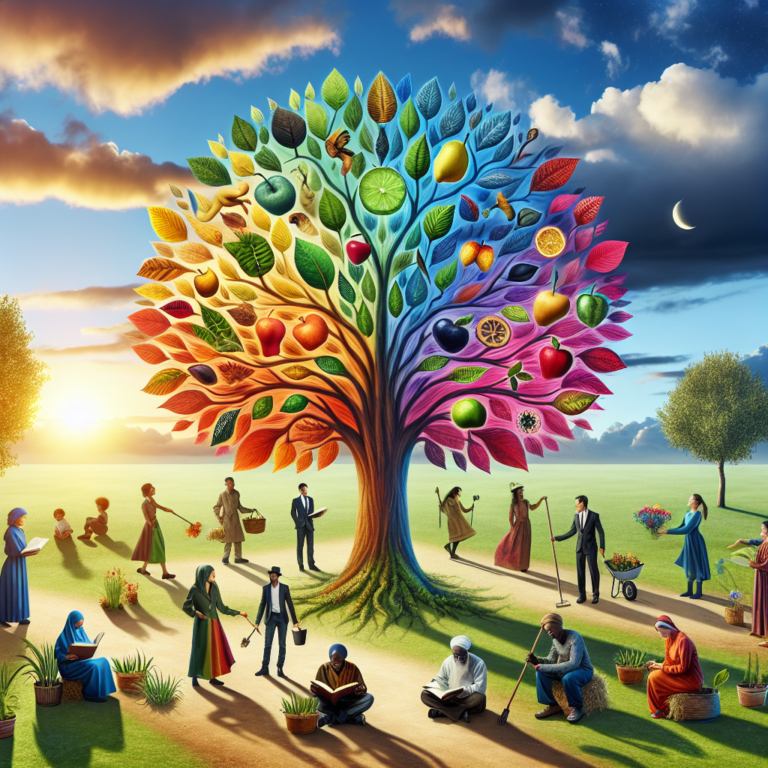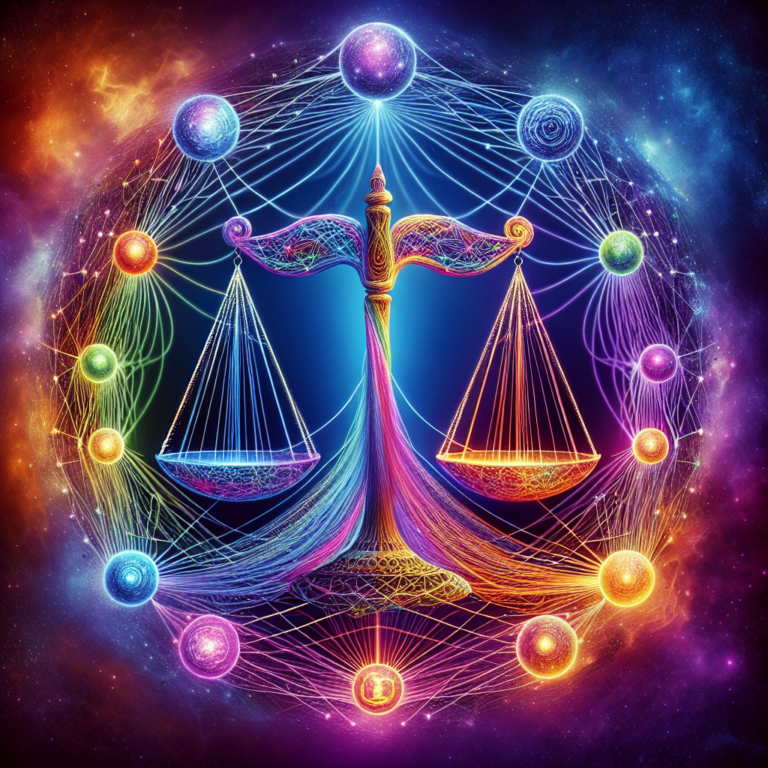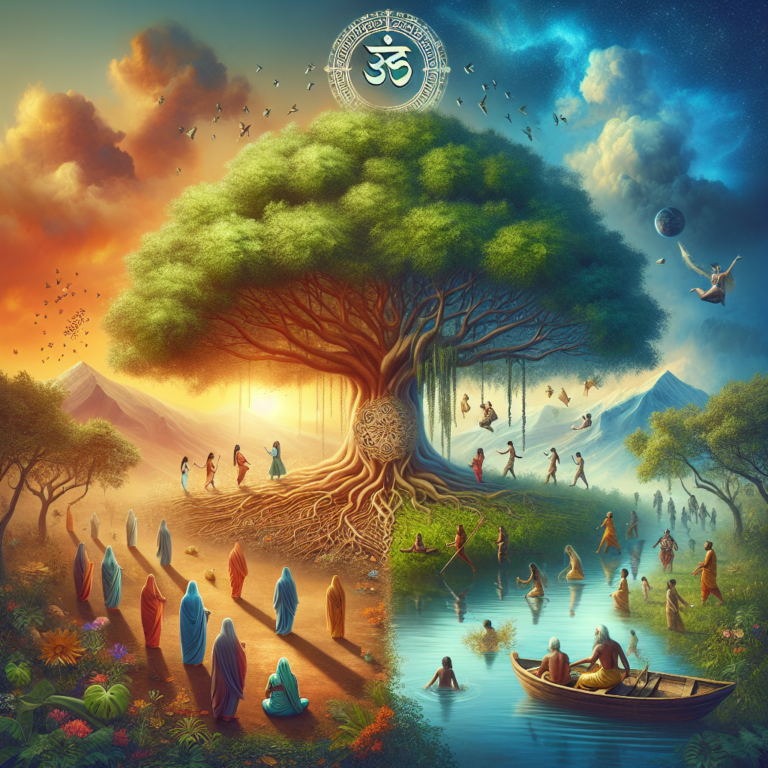The concepts of karma and reincarnation are foundational to many Eastern philosophies, such as Hinduism, Buddhism, Jainism, and Sikhism. These concepts are interwoven with the understanding of life, death, and the cycle of existence. As we delve into this topic, we will explore the origins, definitions, and implications of karma and reincarnation and how they intersect within the various Eastern philosophies.
Understanding Karma
Karma is a multifaceted concept that varies in interpretation across different Eastern traditions. Generally, it can be described as the law of moral cause and effect, where a person’s actions (thoughts, words, and deeds) directly influence their future experiences.
Origins of Karma
The term “karma” derives from the Sanskrit word “karman,” meaning “action” or “deed.” This term has deep philosophical roots, found in the ancient texts of India, such as the Vedas and Upanishads. Karma is not just about the actions themselves but also the intentions behind those actions, emphasizing the moral quality of deeds.
Principles of Karma
Though interpretations may vary, some core principles of karma include:
- Causal Law: Every action has a corresponding reaction. Good actions lead to positive outcomes, while negative actions result in adverse consequences.
- Moral Responsibility: Individuals are responsible for their actions, and thus must be mindful of their deeds, as they shape their current and future lives.
- Intention Matters: The intention behind an action is equally important as the action itself; thus, righteous intentions are crucial for positive karma.
Karma in Different Traditions
While karma is a central tenet in many Eastern philosophies, its significance and interpretation may vary:
Hinduism
In Hinduism, the concept of karma is closely related to dharma (moral duty). It emphasizes that one’s karma influences not just their current life but also future reincarnations. Hindus believe that accumulating positive karma through virtuous actions can lead to a more favorable rebirth.
Buddhism
Buddhism also teaches about karma, stressing the importance of intention. However, unlike Hinduism, Buddhist philosophy posits that karma is not a divine judgment but rather a natural law of cause and effect, devoid of an eternal soul.
Jainism
In Jainism, karma is understood as a form of subtle matter that attaches to the soul as a result of harmful actions. Jains strive to eliminate karma through strict ethical rules, non-violence, and ascetic practices.
Sikhism
Sikhism acknowledges karma but emphasizes the grace of God, suggesting that while actions impact one’s life, divine grace can transcend the effects of karma.
The Concept of Reincarnation
Reincarnation, or the cycle of birth, death, and rebirth (samsara), is another pivotal concept in Eastern philosophies. It is believed that the soul is immortal and undergoes numerous lifetimes, influenced by the accumulated karma from previous actions.
Understanding Reincarnation
The cycle of reincarnation is not just a mechanism of punishment or reward; it is also seen as an opportunity for spiritual growth and evolution. Each life presents opportunities for learning and moral development, ultimately aiming for liberation (moksha or nirvana).
Reincarnation Across Eastern Traditions
Similar to karma, the interpretation of reincarnation varies among different traditions:
Hinduism
In Hindu belief, the soul (atman) is eternal and undergoes reincarnation until it achieves moksha, or liberation from the cycle of samsara. Factors influencing the nature of rebirth include one’s karma and adherence to dharma.
Buddhism
Buddhism frames reincarnation within the concept of “anatta” (non-self), teaching that there is no permanent soul that transmigrates. Instead, the continuity of consciousness creates the illusion of a singular identity across lifetimes until one achieves enlightenment.
Jainism
Reincarnation in Jainism is tied to the accumulation of karma. Jains believe in a cycle of rebirth closely linked to the purity of the soul. The ultimate goal is to cleanse the soul of all karmic particles to attain liberation.
Sikhism
Sikhism acknowledges reincarnation but emphasizes the importance of God’s will. Sikhs believe that through meditation and devotion to God, one can transcend the cycle of rebirth.
The Interplay between Karma and Reincarnation
Karma and reincarnation are intricately linked within Eastern philosophies. The principles of karma lay the groundwork for the experiences one faces in various lifetimes, while reincarnation continually provides opportunities for learning and growth.
Karma as the Architect of Rebirth
The actions and intentions of individuals not only affect their current life but also dictate the circumstances of their next lifetimes. Positive karma may result in a favorable rebirth, while negative karma may lead to unfavorable conditions.
Reincarnation as a Learning Process
Each reincarnation is viewed as a chance to address past actions and their consequences. This perspective encourages individuals to live ethically, fostering compassion and understanding toward others.
Case Studies and Anecdotal Evidence
Many believers in these traditions cite personal experiences or stories of individuals who recall past lives, reinforcing the interplay between karma and reincarnation. These anecdotes often illustrate how unresolved issues from a previous life manifest in current life challenges.
The Philosophical Implications of Karma and Reincarnation
The concepts of karma and reincarnation prompt profound philosophical questions regarding morality, justice, and the nature of existence.
Moral Responsibility and Justice
The principles of karma suggest that individuals are accountable for their actions. This notion of moral responsibility can foster a strong ethical framework, encouraging individuals to act thoughtfully and, ideally, altruistically.
Determinism vs. Free Will
One of the pressing debates surrounding karma and reincarnation is the reconciliation of determinism (the idea that our actions are predestined by past karma) with the belief in free will. Various philosophies propose nuanced views on this relationship, asserting that while karma influences life circumstances, individuals possess the power to change their current path through conscious choices.
The Nature of the Self
Karma and reincarnation challenge conventional understandings of the self. In Buddhism, for instance, the belief in “anatta” posits that the self is an illusion, and understanding this can facilitate detachment from material attachments and desires.
Cultural Expressions of Karma and Reincarnation
The concepts of karma and reincarnation impact art, literature, and social practices across Eastern cultures. Many stories, parables, and artistic expressions embody these themes, often serving as ethical lessons or reflections on human nature.
Literature and Folklore
Various Eastern texts explore the themes of karma and reincarnation. The tales of past lives and the eventual quest for spiritual liberation are common motifs in Hindu epics like the Mahabharata and the Ramayana, as well as in Buddhist Jataka tales.
Art and Symbolism
Art in Eastern cultures often represents the cyclical nature of existence. The lotus flower, for instance, symbolizes purity and enlightenment arising from muddy waters, which resonates with the themes of reincarnation and overcoming past karma.
Modern Interpretations
In contemporary society, the ideas of karma and reincarnation have permeated popular culture, inspiring books, films, and even self-help practices. The modern understanding often emphasizes personal growth and mindfulness, aligning with the ethical teachings of these ancient principles.
Challenges and Criticisms
While karma and reincarnation present compelling frameworks for understanding existence, they also face scrutiny and criticism.
Misinterpretations and Misuse
One challenge is the potential for these concepts to be misinterpreted, leading to fatalism or a lack of accountability for one’s actions. Some people may resign themselves to unfavorable circumstances, believing that they are merely experiencing the consequences of past karma without seeking to change their situation.
The Problem of Evil
The existence of suffering and injustice in the world raises questions about the mechanisms of karma. Critics often question the fairness of a system where individuals face the consequences of actions from past lives that they cannot comprehend, leading to ethical dilemmas about justice and mercy.
Secular Perspectives
In secular contexts, karma and reincarnation may be viewed with skepticism, often dismissed as unscientific beliefs. This perspective emphasizes empirical evidence over metaphysical concepts, challenging the validity of karma as a moral compass and the accuracy of reincarnation as a phenomenon.
Conclusion
The interplay of karma and reincarnation illuminates a complex understanding of existence within Eastern philosophies. These concepts encourage ethical living, offer profound insights into the nature of the self, and inspire spiritual growth. While they present challenges and raise philosophical inquiries, they also compel individuals to reflect on their actions, fostering a deeper connection to both self and society.
As we navigate the intricacies of life, understanding the concepts of karma and reincarnation may provide a meaningful framework through which we can comprehend our experiences, develop moral responsibility, and strive towards liberation from the cycle of suffering.
FAQs
What is karma?
Karma refers to the law of moral cause and effect, where an individual’s actions influence their future experiences and circumstances, both in this life and in future reincarnations.
What is reincarnation?
Reincarnation is the belief that the soul is reborn into new bodies after death, influenced by the accumulated karma from previous lives. This cycle continues until the soul achieves liberation.
How does karma affect my current life?
According to the principles of karma, the actions and intentions you cultivate in your life directly affect your experiences. Good deeds may lead to positive outcomes, while negative actions can result in unfavorable consequences.
Do all Eastern religions believe in karma and reincarnation?
While karma and reincarnation are central tenets in many Eastern philosophies—such as Hinduism, Buddhism, Jainism, and Sikhism—interpretations and emphases on these concepts can vary significantly across different traditions.
Can I change my karma?
Yes, individuals can change their karma by being mindful of their actions, thoughts, and intentions. Engaging in positive behaviors and ethical practices can help accumulate good karma, influencing future experiences positively.
Is there scientific evidence for reincarnation?
Reincarnation is primarily a philosophical and spiritual belief without empirical scientific evidence. However, some anecdotal accounts and research on past life memories have been documented, mainly within specific cultural and religious contexts.
How do I apply these concepts in modern life?
Understanding karma and reincarnation can foster a sense of responsibility for your actions, encourage self-reflection, and guide ethical living. Practicing mindfulness, compassion, and forgiveness can be valuable in applying these concepts to contemporary life.
It seems like you provided just “Prompt.” Could you please clarify or specify what kind of prompt or topic you would like to discuss or explore?, #Interplay #Karma #Reincarnation #Eastern #Philosophies, #Interplay #Karma #Reincarnation #Eastern #Philosophies, 1736395048, the-interplay-of-karma-and-reincarnation-in-eastern-philosophies





